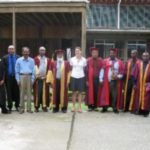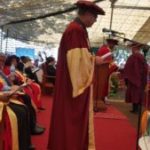Background
In the 21st century, pursuing postgraduate studies at university is not merely a luxury but an essential requirement for gaining knowledge-based employment and driving successful research and innovation within institutions. The sustainable economic growth of a nation relies heavily on the understanding and application of science and technology. Consequently, postgraduate education is critical, not only for fostering innovation but also for leveraging that innovation to enhance individual and societal well-being and promote national development.
The effective utilization of science and technology for growth hinges on a highly skilled population, which, in turn, necessitates a robust and effective university system, the optimal means of producing and maintaining these essential skills. Therefore, increasing the capacity of higher education institutions is vital for ensuring that science and technology contribute meaningfully to a country’s development.
Postgraduate studies and research have long been foundational to the academic programs at the Papua New Guinea University of Technology (PNGUoT). Since its establishment over 51 years ago, PNGUoT has prioritized postgraduate programs, awarding its first PhD degree in 1976. However, the university has faced various challenges over the years that have prompted a reassessment of its focus and strengthened commitment to in-house postgraduate studies and research.
In response to evolving technological landscapes and accumulated experiences, PNGUoT launched its “PNGUoT 2030” vision to align the university’s strategic direction with current government policies, particularly as articulated in Vision 2050 and the Development Strategic Plan (DSP) 2030. These frameworks emphasize the promotion of scholarships, externalization of academic programs, and fostering entrepreneurial quality development.
To enhance scholarship quality and bolster in-house postgraduate programs, PNGUoT initiated the Graduate Assistantship Program (GAP) in 2001, aiming to attract promising first-degree graduates with strong academic records and/or relevant industrial experience to pursue Masters and PhD degrees. Today, PNGUoT offers a range of research-based degrees, including Doctor of Philosophy (PhD) and Master of Philosophy (MPhil), alongside course-based Master’s and Postgraduate Certificate programs. Currently, all 13 academic schools at PNGUoT host postgraduate programs, with the majority offering degrees at the Masters and PhD level. With a total of 63 postgraduate programs, PNGUoT boasts the largest such offering in the country and continues to expand.
Annually, the university organizes research presentations by postgraduate students, providing them a platform to showcase their studies and research capabilities while enhancing their communication and presentation skills. This hallmark event attracts university academics, students, staff, and stakeholders from various organizations, fostering a culture of research at PNGUoT and throughout Papua New Guinea.
To further strengthen its postgraduate studies and research initiatives, PNGUoT appointed a Dean for the Faculty of Postgraduate Studies Research and Innovation in 2013, with the faculty’s name being updated in 2023 from the former School of Postgraduate Studies. This appointment serves to coordinate all postgraduate activities effectively. Additionally, the university has established four professorial positions in each academic school, coupled with an active recruitment drive aimed at attracting senior academics with PG supervision experience. Adjunct Faculty positions have also been created to tap into the regional expertise available in sister organizations and institutions. Strategic partnerships through Memoranda of Understanding (MoUs) with various organizations further enhance the university’s research facilities and human resources, as each academic school develops strategic plans with specific KPIs aligned with national priorities and development goals.
PNGUoT is committed to the internationalization of its academic programs, integrating an international, intercultural, and global perspective into its core mission, specifically, preparing graduates to compete on a global scale. To this end, the university seeks to recruit international students, increase staff and scholar exchange programs, promote the internationalization of its curriculum, and foster research and educational partnerships both regionally and globally. Such initiatives will provide PNGUoT with a competitive edge in terms of innovation, quality maintenance, commitment to corporate social responsibility, and ongoing adaptation to diverse cultures and systems.
Additionally, since 2012, PNGUoT has partnered with several initiatives, including the Caribbean and Pacific Island Mobility Scheme (CARPIMS), Building University Links for Action (BULA), and Associate Partners with DREAM-ACP, KITE, and AGLE projects funded by the European Union under the ERASMUS Mundus program. Through these collaborations, PNGUoT and its partner universities can share experiences, adopt best practices, explore innovative learning approaches, and create opportunities for collaborative research, ultimately enhancing graduates’ interpersonal skills and job prospects.



